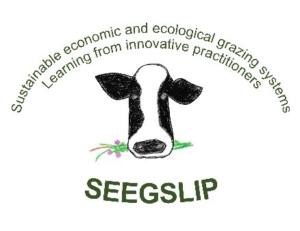
Acronym : SEEGSLIP
Contract Period : 01/01/2018 - 01/01/2021
Project Webpage : https://www.ceh.ac.uk/our-science/projects/seegslip
ORC Staff Contact : Lisa Arguile
The project aims to evaluate the ecological, agronomic, economic and social impacts of the pasture fed livestock approach to grazing management and its potential as the basis of a sustainable GB-wide system.
Our research aims to evaluate the ecological, agronomic, economic and social impacts of the pasture-fed livestock approach to grazing management and its potential as the basis of a sustainable GB-wide system. A team of researchers from different scientific disciplines (from CEH, Lancaster University, SRUC and the Organic Research Centre) led by Dr Lisa Norton at CEH will carry out a formal assessment of the agronomic, socio-ecological and sustainability and resilience aspects of Pasture Fed Livestock Association (PFLA) members’ farm systems and the social systems in which they are embedded (including industry bodies and citizen-consumers). The team will work closely with producers, the PFLA and other supporting organisations as key project partners, to assess sustainability and gain a holistic picture of their practices. In 2018, we hope to cover a broad spectrum of sixty beef PLFA enterprises to gain an overview of the farms which will be compared to existing data on livestock farms from previous studies. In 2019, we will focus on a smaller subset of farms and will carry out more detailed data collection to assess specific management practices, like ‘mob grazing’ and gain a deeper understanding of the PFLA systems.
During the project we will work closely with farmers to help them to assess the ‘health’ of their own systems, including specific soil and vegetation measures. The evidence provided by the project will be aimed at informing livestock farmers, consumers of Pasture for Life products and the wider public as well as policy makers and farming bodies, like the Agriculture and Horticulture Development Board (AHDB). The prospect of a resilient and productive grassland landscape which is storing carbon, preserving water quality and enhancing biodiversity is compelling for farmers, governments and wider publics.
ORC’s input will focus on the appication of the Public Goods Tool on 60 pasture-fed livestock farms.